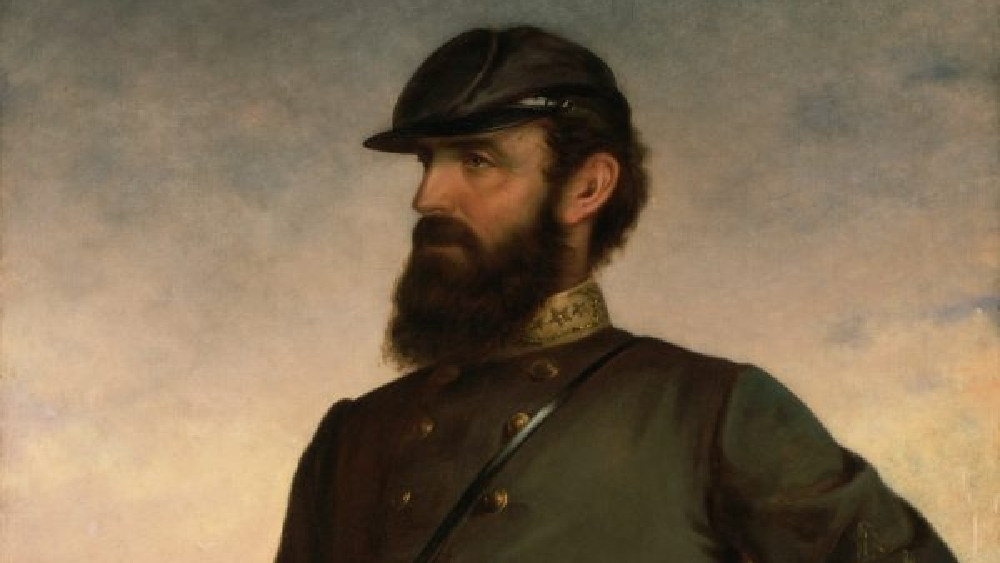Thomas Jonathan “Stonewall” Jackson, born on January 21, 1824, in Clarksburg, Virginia (now West Virginia), was a Confederate general officer during the American Civil War. Known for his sharp mind and unwavering determination, Jackson was a key figure in the Confederate Army whose impact on military history is still remembered today.
Early Life and Military Education
Stonewall Jackson’s journey through life was forged in the crucible of hardship and perseverance. Orphaned during his childhood, he confronted a series of adversities that might have deterred a lesser individual. However, Jackson’s indomitable spirit and dedication to his education shone through even in his early years. Despite the challenges he faced, he excelled in his studies, demonstrating a thirst for knowledge and a tenacity that would define his character throughout his life.
Jackson’s path led him to the United States Military Academy at West Point, a pivotal juncture in his life. At West Point, he honed his academic skills and built a strong foundation in military tactics and strategy, enhancing his capabilities. This education proved invaluable as Jackson became one of the esteemed American Civil War military commanders in the future. West Point was pivotal in his military journey, laying the groundwork for remarkable achievements and the enduring “Stonewall” moniker.
Stonewall Jackson: Service in the Mexican-American War
Stonewall Jackson’s military baptism occurred in the Mexican-American War, spanning from 1846 to 1848, shaping his future. In this conflict, Jackson, a junior officer, showcased remarkable valor and leadership qualities on the battlefield, solidifying his reputation. His brave battlefield actions garnered respect from comrades and foreshadowed his future prominence as a military leader. These early experiences under fire in Mexico would serve as a crucial crucible in shaping Jackson’s military career.
The Mexican-American War provided Jackson with an invaluable education in warfare, honing his military skills and tactics. It was during this time that he developed the discipline and dedication that would become hallmarks of his leadership style. Experiences in Mexico instilled a profound duty to his country and military service, defining loyalty during the Civil War. Stonewall Jackson’s Mexican-American War service shaped his life, setting the stage for the remarkable military career to come.
Professorship at Virginia Military Institute
After the Mexican-American War, Jackson transitioned to education, leaving a substantial impact in the classroom and demonstrating his versatility. He became a professor of natural and experimental philosophy at the Virginia Military Institute (VMI) in Lexington, Virginia. In this role, Jackson’s teaching passion and profound military knowledge took the spotlight, enriching his students’ understanding. He introduced unorthodox teaching methods and maintained strict discipline, earning both respect and notoriety among his students.
Jackson’s distinctive approach to teaching and his commitment to the principles of discipline and duty led to the moniker “Old Blue Light” bestowed upon him by his students. This nickname was a testament to the intense dedication he brought to his role at VMI. During his tenure as a professor, Jackson not only imparted valuable knowledge but also instilled in his students a deep sense of honor and responsibility. Though his time at VMI was relatively short, it left a lasting impact. He quickly earned a reputation for being principled and disciplined—traits that would go on to define his legendary leadership during the American Civil War.
Stonewall Jackson: Civil War Begins: First Battle of Bull Run
The eruption of the Civil War in 1861 brought Stonewall Jackson to the forefront of the conflict and fundamentally transformed his life. Jackson’s meteoric rise in the ranks of the Confederate Army was evident during the First Battle of Bull Run, also known as the First Battle of Manassas. In this crucial early engagement of the war, he distinguished himself as a Confederate brigade commander, displaying remarkable leadership and military acumen.
The battle would forever link his name with the influential moniker “Stonewall.” This nickname was a reflection of his resolve and steadfast defense against Union forces. Jackson’s exceptional leadership and his brigade’s resilience during this battle played a pivotal role in securing a Confederate victory and cementing his status as one of the most renowned military figures of the American Civil War. This event marked the beginning of a legendary military career, during which Stonewall Jackson would become known for his tactical brilliance and unyielding commitment to the Confederate cause.
Valley Campaign and Shenandoah Valley
Stonewall Jackson’s military prowess reached its zenith during the legendary Valley Campaign in the picturesque Shenandoah Valley of Virginia. Through a remarkable series of maneuvers and engagements, Jackson demonstrated exceptional strategic acumen and tactical brilliance. His ability to outmaneuver and defeat Union forces in the Shenandoah Valley was nothing short of extraordinary.
This campaign held immense strategic significance. By keeping Union troops occupied and preventing their reinforcement of General George McClellan’s Army of the Potomac in the Peninsula Campaign, Jackson not only safeguarded Confederate interests but also reshaped the course of the Civil War. His relentless pursuit of excellence and dedication to the Confederate cause during the Valley Campaign solidified his reputation as one of the Confederacy’s most formidable and revered commanders. Stonewall Jackson’s brilliant exploits in the Shenandoah Valley remain a testament to his military genius and the enduring impact he had on the trajectory of the American Civil War.
Chancellorsville and Tragic Death
One of the most celebrated moments in Stonewall Jackson’s military career occurred at the Battle of Chancellorsville in May 1863. Here, he displayed his audacious brilliance by executing a daring flanking maneuver that resulted in a remarkable Confederate victory. Jackson’s tactical genius and swift decision-making were on full display, as his bold actions caught the Union Army off guard and led to a significant Confederate triumph. This battle further solidified his reputation as one of the most remarkable military commanders of the American Civil War.
Tragically, the victory at Chancellorsville was marred by a devastating incident. During the battle, Stonewall Jackson was accidentally wounded by Confederate troops in a case of friendly fire. The injuries he sustained were severe, and despite the best efforts of medical professionals, he succumbed to complications from his wounds just a few days later. His untimely death was a profound loss to the Confederate cause, as he was not only a brilliant military strategist but also a beloved and revered figure among his troops and leaders. Jackson’s legacy lives on as a testament to his extraordinary contributions to the Confederate war effort and his indomitable spirit on the battlefield.

Stonewall Jackson: Legacy and Historical Assessment
Stonewall Jackson’s legacy in the annals of military history remains unassailable. People revere him as a symbol of military excellence and dedication to duty. His innovative tactics, particularly his flanking maneuvers and rapid decision-making on the battlefield, have left a lasting impact. They continue to be subjects of study and admiration at military academies worldwide. Jackson’s bold and brilliant leadership during the American Civil War made a lasting impact on military strategy. Even today, his name stands out as a symbol of fearless command and tactical genius on the battlefield.
However, Jackson’s historical assessment is also marked by complexity and controversy. While he is celebrated for his military genius, his association with the Confederate cause during the Civil War has led to ongoing debates about his legacy. Jackson’s allegiance to the Confederacy, a government built on preserving slavery and seceding from the United States, raises moral and ethical questions. These questions continue to shape discussions about his historical significance. These debates highlight the nuanced and multifaceted nature of history. They emphasize the need to confront the complexities of individuals who played pivotal roles in shaping events, even in times of turmoil and moral ambiguity.











